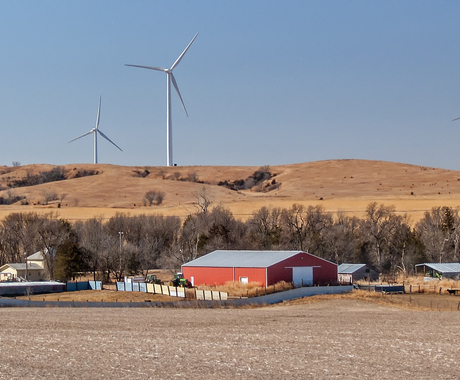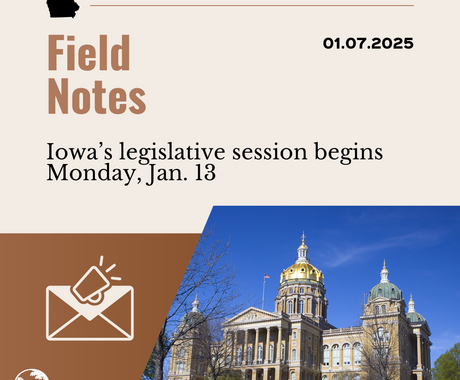By Johnathan Hladik, former policy director
Nebraska lawmakers took significant steps to improve rural broadband with the passage of Legislative Bills 992 and 996 in the final weeks of an unusual 2020 session, which adjourned Aug. 13.
After returning from a nearly four month recess due to COVID-19 concerns, the Unicameral reconvened on July 20. The final weeks of the session also saw a compromise struck in an effort to provide property tax relief with the passage of LB 1107. Although there are still issues to be addressed, the Center applauds legislators for moving forward.
Several bills supported by the Center did not advance, however, we look forward to continuing to work with lawmakers on those issues in 2021.
Read more about those bills, as well as Legislative Bills 992, 996, and 1107 below.
Budget and tax
LB 1107 (Scheer) Neutral → Adopt the ImagiNE Nebraska Act, provide for property tax relief, adopt the Nebraska Transformational Projects Act, and other provisions.
In the final days of the session, a compromise was adopted to move forward with three major issues: a major tax incentive, property tax relief, and large University of Nebraska Medical Center (UNMC) project.
The previous proposal, LB 1106, failed to gain enough votes to pass prompting a different approach to resolving the issue. The major tax incentive, the ImagiNE Nebraska Act, remained mostly intact. This is an updated version of the previous tax incentive, the Nebraska Advantage. The cost of the incentive is capped at $25 million for the first two years and increases to 3 percent of state tax receipts from years six out. It is mostly focused on attracting and growing large businesses within the state by providing tax credits for various investments.
For property tax relief, the bill will maintain $275 million a year in the property tax credit program, and designate a portion of any increased revenues from gambling. It will also create a refundable income tax credit for property taxpayers funded at $125 million in 2020 and increasing to $375 million over four years. After that point, growth in the credit will change with valuation growth. While certainly property tax relief, it does not change the larger structure of how schools and local governments are funded.
Finally, it will provide $300 million in funding for UNMC NExT, a $2.6 billion Department of Defense initiated project, should it be approved. A new medical center and federal hazard response facility would be created. The state will pay $50 million per year over six years starting in 2025.
Passed on final reading with emergency clause 41-4-4. Signed by the governor on Aug. 17.
We applaud legislators for striking this compromise. The bill is filled with both positives and negatives from a rural perspective. The property tax relief is helpful, but still inadequate. The new business incentive package will spur economic growth in rural communities, but does little for microentrepreneurs. Time will tell whether the safeguards legislators included to protect current state budget expenditures will be effective.
Economic and community development
LB 879 (Geist) Oppose → Eliminate funding for the Nebraska Advantage Microenterprise Tax Credit Act and change the termination date for applications.
LB 879 would bring an early sunset to the Nebraska Advantage Microenterprise Tax Credit and redirect the roughly $2 million in funds to the Business Innovation Act under the Department of Economic Development. The Microenterprise Tax Credit, established in 2005, provides a 20 percent refundable income tax credit up to $10,000 to businesses with five or fewer employees, based on designated investments in their business. This tax credit has been a critical asset to rural and small business owners who are not eligible for larger tax credit programs.
Indefinitely postponed.
While we lead the effort to defeat LB 879 in 2020, we anticipate a similar bill will be introduced in 2021. It is important for small entrepreneurs across the state to remain engaged and make sure their senators know the important role micro businesses play in our rural communities.
See our op-ed that appeared in the Lincoln Journal Star.
LB 996 (Brandt) Support → Create the Broadband Data Improvement Program.
This legislation, drafted by the Center in partnership with Sen. Brandt’s office, would create the Broadband Data Improvement Program. Passage of this bill will help ensure the state is able to fully access federal broadband grant programs by complying with data verification requirements set forth by the Federal Communications Commission. Should no federal guidelines be established for crowdsourcing data to better complete Nebraska’s broadband map, the Public Service Commission would create a crowdsourcing program, promote the program and allow for feedback on inaccuracies on federal broadband data. This legislation was brought forth as a result of Center constituents expressing concerns about inaccuracies in broadband map data and lack of service access.
Signed by the governor on July 27.
This bill opens the door for a greater share of federal funds directed at financing broadband expansion in rural and unserved areas of our state. In today’s world, having access to the internet has become just as important as other utilities citizens have come to rely on, such as electricity, water, and sewer. From Omaha to Scottsbluff, Superior to Valentine, and all areas in between, broadband service is critical to business, farms and ranches, the education of young people, and health care services. We appreciate Sen. Brandt’s diligence in working with the Center to get this important piece of legislation passed.
Center for Rural Affairs legislation
See our op-ed that appeared in the Omaha World-Herald.
Omaha World-Herald Editorial: Virus emergency shows need for increased focus on rural broadband
LB 992 (Friesen) Support → Adopt the Broadband Internet Service Infrastructure Act and provide for certain broadband and internet-related services.
This bill seeks to implement elements of the Rural Broadband Task Force report released in late 2019. This would be achieved by allowing broadband providers to utilize electric utility easements in order to expand infrastructure. The bill would also create the position of a state broadband coordinator to encourage county-based solutions to broadband development and explore the creation of cooperatives in underserved areas of the state. Finally, the bill would establish a separate fund in order to support the construction of fiber optic networks for public libraries across the state.
Passed 47-0-2 on final reading Aug. 11. Signed by the governor on Aug. 15.
This is a significant step for rural broadband. By implementing several recommendations made by the Rural Broadband Task Force, lawmakers are showing a greater understanding of this issue. Legislative Resolution 438 requires continued monitoring of Task Force proceedings, may provide opportunity for legislation in 2021.
Food and agriculture
LB 28 (Kolterman) Support → Authorize damages for property taxes and special assessments paid on property lost through adverse possession.
Nebraska’s doctrine of adverse possession, which can result in landowners losing all or part of their land, has not been updated since 1869. The bill would make needed changes to this principle, allowing the court to award damages to a landowner who in good faith pays all of their property taxes when doing so is the fair and equitable outcome. Amendment (AM) 2281 alters the implementation date from 2020 to 2021. The impetus for this legislation came from Center supporters.
Indefinitely postponed.
Bad actors often take advantage of adverse possession to harm landowners who are acting in good faith. This past session, the judiciary committee voted LB 28 out of committee, but without a priority designation, it was not debated on the floor. We encourage Sen. Kolterman and others to monitor this issue going forward.
Center for Rural Affairs legislation
Resources: Adverse to change: a modern look at adverse possession
LB 255 (McCollister) Support → Change provisions relating to the Supplemental Nutrition Assistance Program (SNAP).
LB 255 would mitigate the SNAP cliff effect by increasing the gross income limit to 140 percent of the federal poverty level from the current 130 percent of federal poverty level. While retaining net income requirements, this legislation would allow families to maintain SNAP eligibility with incremental income increases.
Indefinitely postponed.
This is one of several bills dealing with food access challenges during the 2020 session. We know the hardships created by COVID-19 have led to even greater food insecurity in our rural communities. We will work with key partners in 2021 to address this issue.
Health care
LB 1116 (Morfeld) Support → Adopt the New School Construction and Water Access Act.
The school buildings where Nebraska students spend much of their day can help shape habits and curb our state’s levels of obesity by increasing access to and the consumption of water by students. Right now, schools are asked to follow two conflicting requirements when planning for new school construction. LB 1116 sets one standard. The bill ensures at least one drinking fountain will be installed on each floor of a new school building, a practice widely accepted among Nebraska schools. The bill only applies to new school construction. Moreover, the act will require water fountains to be regularly cleaned and maintained, in order to dispense clean drinking water. These small actions will help form the lifelong behaviors that will make for a healthier Nebraska.
Indefinitely postponed.
Despite receiving broad-based support, this bill did not advance out of committee. However, on July 28, Sen. Walz introduced LR 436 to continue this important discussion. LR 436 provides for an Interim study to determine whether elementary and secondary students in Nebraska have adequate access to clean drinking water throughout the school day. The Center will work with key stakeholders as we continue to address this important issue and look for a path forward in 2021.





